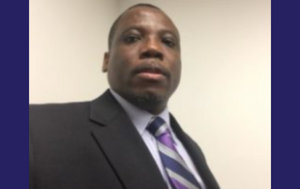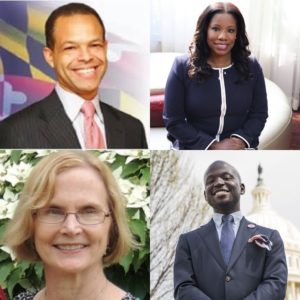Global Health and Education Projects, Inc. (GHEP) is a recipient of one of Maryland Humanities’ Voices and Votes Electoral Engagement Project Grants. The organization will use the grant to host a a one-day virtual voter education and community conversation titled “U.S. Elections 101.” This workshop will educate participants on key aspects of U.S. elections, including the Electoral College, rules for voter eligibility, resources for voter registrations, and the differences between the U.S. electoral system and systems in other parts of the world. The event is geared toward Black citizens and immigrant groups, though all are welcome. We spoke to Romuladus Azuine, GHEP’s Founder and Executive Director.
*****
 Q: Can give a brief description of Global Health and Education Projects? How old is the organization?
Q: Can give a brief description of Global Health and Education Projects? How old is the organization?
A: The mission of the Global Health and Education Projects, Inc. (GHEP) is to eliminate health and education disparities or inequities in local communities in the United States and around the world by implementing programs that address the social determinants of health (SDOH) and human development. Social determinants are the underlying, root-causes of health and education disparities and poverty in our society. Our projects provide pipelines of access to opportunities and resources that help our community members break inter-generational cycles of health and education disparities and socioeconomic adversities. GHEP will celebrate its 10th year anniversary in August this year, so we are relatively a young organization.
Q: How did you come up with “U.S. Elections 101”?
A: GHEP focuses its programs around two major foci areas: health and education. Civic education (also known as citizen education or democracy education) refers to the provision of information and learning experiences to equip and empower citizens to participate in democratic processes. Many people don’t know this, but civic participation is a key issue in one of the five domains of the social determinants of health (SDOH), namely, the Social and Community Context. Civic education promotes civic engagement and support democratic and participatory governance. Civic education has been used to address a wide variety of political and governance issues (e.g. corruption, civic apathy or post-conflict reconciliation) as well as important social issues. Unlike in other countries, there is a lot of misunderstanding about the role of individual votes in the U.S. Electoral College system. When not well-understood, many people tend to think that it is not important to vote because the electors will elect whom they want regardless of the people’s votes. This misunderstanding can lead to poor civic education, voter apathy, non-engagement in civic participation and ultimately non-engagement in the democratic process.
Q: What is this project’s goal?
A: Our overarching goal here is to underscore the importance of civic education and participation as key planks of one of the social determinants of health. This project seeks to educate individuals from minority and immigrant communities on the key aspects of the U.S. elections that are similar to or different from other countries. Specifically, we are seeking to: 1) increase knowledge and awareness of the U.S. Electoral College; 2) understand the similarities and differences between the U.S. electoral system and selected systems in perhaps Africa and Latin America; 3) understand voter eligibility and resources for voter registration.
Q: Could you discuss the role the humanities–like history and literature–play in the U.S. Elections 101. How do the humanities help in the overarching goals of Global Health and Education Projects?
A: There is an age-long relationship between humanities and health. Specifically, the relationship between humanities and both healthcare delivery and health inequities are well-known and well-acknowledged in the literature. Experts agree that training in the humanities can help public health practitioners, medical practitioners, and those working within the field of health to better understand, relate to, and care for their patients or the populations that they design programs for. In fact, when it comes down to it, health care is fundamentally about dealing with people. Civic participation falls within one of the five domains of the social determinants of health (Social and Community Context), which is the underlying framework four programs.
Q: What couldn’t the organization not accomplish without the Maryland Humanities grant?
A: For many funders, presenting an argument that civic education is an essential component of addressing the social determinants of health is a long stretch. However, for Maryland Humanities, it was not so difficult pitching a compelling argument as to why a health non-profit organization should be educating the public on civic education. Without Maryland Humanities, I can tell you right away that there is no way this project would have been possible. The ability to present civic education in a non-partisan manner accessible to all people regardless of political affiliation is remarkably refreshing.
Q: How did you act when you received the grant?
A: We were very ecstatic. Giving us the ability to implement this work helps to lay the foundation for subsequent programming in this area of non-partisan civic education and participation. We are truly grateful to Maryland Humanities for finding this project.

Q: What pieces of U.S Elections 101 does the Maryland Humanities grant fund?
A: The Maryland Humanities grant funded the core components of the program. We had to leverage the goodwill of our volunteers and partners. It is important to add that all our 4 guest speakers are presenting pro bono. We are appreciative of their partnership.
Q: Why is this project important right now? In Maryland?
A: The 2020 Presidential election was a turning point in U.S. Electoral history. The Electoral College that was hitherto unknown was under the spotlight. Through all this, it was evident that unlike in other countries, there is a lot of misunderstanding about the role of individual votes in the U.S. Electoral College system. It is important for citizens to understand that they have power in the electoral process and that their voices count. For Marylanders, it is important to understand how they can engage with their elected public officials and have their voices heard.
Q: Is there anything else you’d like to share?
A: We are grateful to all our Guest Speakers for their time and expertise. [The Speakers are Barbara Crain, VP of the League of Women Voters of Maryland; Representative Dr. Oye Owolewa of D.C.; State Senator Malcolm Augustine of Prince George’s County; and Aisha N. Braveboy, State’s Attorney of Prince George’s County.] Having them as Guest Speaker truly brought out the importance they place on the voices of the people and their engagement in the electoral process. We applaud all our partners and our volunteers who worked hard to make this project see the light of the day.
VVEEP was funded by the ‘Why It Matters: Civic and Electoral Participation’ initiative, administered by the Federation of State Humanities Councils and funded by the Andrew W. Mellon Foundation. Register for the event here. Learn more about GHEP here. Disclaimer: The views and opinions expressed on our blog do not necessarily reflect the views or position of Maryland Humanities or our funders.

